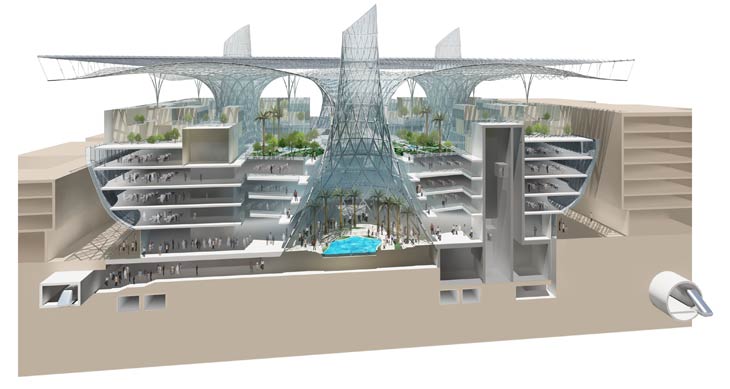There are a lot of people in the sustainability community, including a number of important NGOs, who are looking at the planned carbon neutral, zero waste "Masdar City" project as a laboratory for technologies that could reduce human impacts on the environment, as well as eliminate the use of nonrenewable energy.
In other words, it's a testing ground. Being a human endeavor, it's also unlikely to be perfect. But many expect a lot of good things are going to come out of it.
Others, however, are less sure. Reporters seeking balance cite some commentators who say carbon footprint reduction is so difficult as to be impossible, or that Masdar will just be for the affluent. Some have even dismissed Masdar as purely symbolic -- and even "just a lot of hype."
Do these non-specific criticisms hold water? Let's start with a definition from the Oxford American Dictionary:
Hype
Noun; 1. extravagant or intensive publicity or promotion; 2. a deception carried out for the sake of publicity.
Noun; 1. extravagant or intensive publicity or promotion; 2. a deception carried out for the sake of publicity.
Re 1: Masdar is certainly getting a lot of intense publicity. The whole thing was launched at a conference in Abu Dhabi, near the Masdar site, attended by business and world leaders -- even global warming skeptic George Dubya Bush. But can all this PR be considered 'extravagant' in context of the wealth on display in the region's urban growth? Also consider that Masdar's total cost, $22 billion over eight years, is less than what the Dubya spends in Iraq every two months so Big Oil can get its mitts on that country's petroleum.
Re 2: Is there anything deceptive about the project? I would tend to think that Masdar's NGO and corporate partners have vetted the project's bona fides. Those who have endorsed or are engaged in work on Masdar include World Fund for Nature/World Wildlife Fund, BioRegional, Massachusetts Institute of Technology, and CH2M Hill. Lord Norman Foster, the architect who did the "Gherkin" building at London's Canary Wharf, is doing the Masdar urban master plan.
While it is not a partner, the U.S. Congress has heard testimony about Masdar from its head, Sultan Ahmed Al Jaber, earning the praise of Rep. Ed Markey (D-MA), chairman of the energy independence/global warming select committee.
But the biggest indicator is whether Masdar's actions to date match its stated intentions -- what is Masdar doing with its money? Answer: a lot. A survey of Masdar-related news reveals it is those actions that are garnering all the media attention:
•Is investing $2 billion to start its own industry to produce "thin film" solar energy systems
•With its partner Virgin Green Fund, has purchased Dura-Therm, an oil cleanup and metal recycling business
•Has invested $42 million in the U.S. waste-to-energy company EnerTech
•Is hiring faculty for the Masdar Institute of Science and Technology
Simply put, Masdar is putting its considerable money where its mouth is. I've seen no substantive criticisms of any of these moves, merely a response from the business and environmental press at Masdar's speed that borders on awestruck.
Rather than some pie in the sky fantasy that always seem to be just out of reach, what is clear is that Masdar is happening. And they are starting by investing in practical, real technologies. So yes, Masdar is for real.
And while I thank the skeptics for helping us maintain perspective, this time I have to ask why they insist this well-funded glass of recycled water has to be half empty.
•Is planning (with engineering consultant CH2M Hill of Denver) a city-wide electric personal rapid transit system, like those under construction at Heathrow airport and planned for Sweden. Such a system would use a fraction of the energy (on a passenger-mile basis) of traditional transit systems. It is reasonable to expect this project will be as well-funded as the others.
Simply put, Masdar is putting its considerable money where its mouth is. I've seen no substantive criticisms of any of these moves, merely a response from the business and environmental press at Masdar's speed that borders on awestruck.
Rather than some pie in the sky fantasy that always seem to be just out of reach, what is clear is that Masdar is happening. And they are starting by investing in practical, real technologies. So yes, Masdar is for real.
And while I thank the skeptics for helping us maintain perspective, this time I have to ask why they insist this well-funded glass of recycled water has to be half empty.

No comments:
Post a Comment